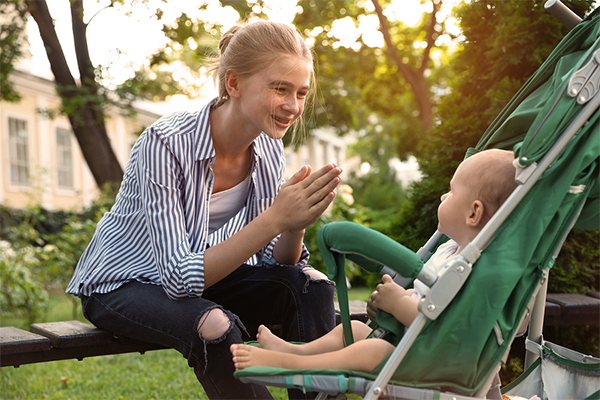Is your child ready to join the babysitters’ club?
It’s more than just being responsible
For many of us, babysitting was our first job.
But be honest: How prepared were you, really?
“That’s why Safe Sitter was started,” said Renee McCabe, Safe Kids coordinator at the Children’s Hospital of Georgia. After all, even the most responsible preteen babysitter can get overwhelmed if they’re watching a young child who won’t stop crying or if, worst-case scenario, an emergency occurs. “The program teaches babysitters how to successfully handle these kinds of situations ahead of time, so they don’t have to struggle to figure it out while they’re in the situation.”
Babysitting, after all, is about much more than what its name implies. Babysitters need to know about how to take care of a wide age range of children, including behavior management. They need to be aware of how to keep themselves and their young charges safe. In an emergency, they need to act swiftly and know exactly what to do. And as the first job for many a preteen, it’s an opportunity to learn invaluable lessons about life and business.
Think your child is ready to get started? Here are a few tips from Safe Sitter:
1) Be age appropriate. “If your child is 11 to 13, that’s a great time for him or her to start babysitting,” said McCabe. “They’re young enough to be engaged with younger children, but old enough to be responsible and not as distracted.” But if your child is just starting to babysit, it’s a good idea to match him or her with a preschooler, not a toddler or a baby: Preschoolers are potty-trained, young enough to listen to and not challenge their babysitter and aren’t as dependent as younger kids are.
2) Get in some practice. A great place for your child to practice babysitting is at the church nursery or watching younger siblings or relatives while parents are near enough to act as a backup.
3) Remember: Safety first, always. A Safe Sitter course is the perfect opportunity for a future babysitter to learn how to keep themselves and the kids they are watching safe. “So many scenarios could happen,” said McCabe. “You don’t want to frighten your child, but you do want to educate your child so that he or she can act confidently should the worst happen.” Being able to speak clearly to 911 or the Poison Control Center or to perform first aid or even CPR are all valuable skills. “In fact, since Safe Sitter was launched 35 years ago, nearly 200 lives of young children have been saved, many from choking, thanks to the quick thinking of their educated babysitters,” said McCabe.
4) Know the facts, ahead of time. Babysitters should gather all the key information they need from the parents, well before parents are rushing out the door to go on that dinner date. Make sure your child asks to come a little early or even the day before to go over information, including:
- Parents’ cell phone number
- An alternate phone number
- A backup adult name and phone number
- Where parents will be
- A tour of phone locations, locks, alarm systems, children’s rooms, rooms that are off limits, diapering supplies if needed, first aid supplies and a flashlight
- The rules, such as for phone or TV use or games and other devices; outside play; and pet routines
- Specific babysitting information such as: What time is bedtime? What kind of games do your kids like to play? What will they eat for snacks/meals? And do they need help with toileting? Babysitters should also ask about any allergies or medications needed as well as insights on comforting young children or controlling their behavior.
5) Get ready to have fun. For the most part, babysitting should be fun, for both the babysitter and the child who’s being watched. Playing games, singing, dancing, reading books and being silly should all be part of a babysitter’s repertoire. “Having fun is the easiest thing to remember and will earn you the rating of ‘Best Babysitter’ and guaranteed job security!” said McCabe.
The Children’s Hospital of Georgia offers the day-long Safe Sitter course for young teens in grades 6 to 8 on June 16, July 7, August 5, October 7, December 29, February 10 and April 6. The course fee is $40. To find out more, visit www.augustahealth.org/safesitter or call 706-721-7606.




